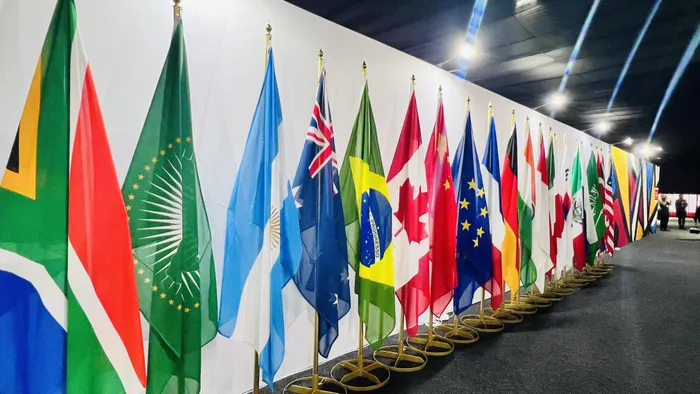
The G20 Leaders’ Summit adopted the declaration over the weekend in Johannesburg.
Image: Thabo Makwakwa / IOL News
The 2025 G20 Leaders’ Summit, which convened for the first time in Africa, concluded the weekend with an adopted declaration but missed an opportunity to address reparations.
The final communiqué affirmed the right of nations to reclaim looted cultural heritage.
The G20 Leaders' Declaration, adopted on November 23, 2025, focused on global financial stability, debt sustainability for low-income countries, climate finance, and inclusive growth.
African reparations were not an agenda item in the main inter-governmental negotiations.
Under the presidency of Cyril Ramaphosa, the summit secured the inclusion of Paragraph 112 in the leaders’ declaration: “We acknowledge the importance attached by the countries of origin to the return or restitution of cultural property … of fundamental spiritual, historical and cultural value to them.”
In his opening address, Ramaphosa framed the gathering as “an affirmation of our common humanity,” declaring that Africa, at last, had taken its “rightful and responsible place in the community of nations.”
A partial victory: Culture recognised, not compensated
For decades, African nations, scholars, and activists have demanded the return of artefacts and ancestral remains looted during colonial rule.
South Africa has so far covered the expenses of locating, exhuming, and reburying the remains of disappeared persons, a measure that has seen a degree of success.
The Johannesburg declaration moves the issue into the multilateral arena, stripping it of the cloak of museum-level negotiations and placing it firmly on the global policy agenda.
With culture now formally recognised as a pillar of international cooperation, alongside debt, climate, and trade, the hope is that this commitment will foster bilateral and multilateral restitution agreements previously resisted by major museums.
Within the summit’s broader agenda, Paragraph 113 further reaffirmed the G20’s shared vow of zero tolerance against corruption and illicit financial flows, signalling a broader push for transparency and equity in global financial governance.
The silence that echoes loudest
Notably absent from the 122-point document was any reference to “reparations”, the financial or material compensation for centuries of colonial exploitation.
This omission underscored a wider reluctance among global powers to link historical wrongdoing with contemporary financial responsibility.
Observers argue that cultural restitution, while symbolically powerful, cannot rebuild the economic infrastructure colonialism destroyed, nor can it redress inequalities rooted in centuries of systematic extraction.
Too many people, reparations, are not a luxury but rather a way of preserving their dignity and history.
The country has so far received reparations from many countries.
From symbols to sovereignty: Africa’s long road ahead
Including cultural restitution in the G20 declaration gives African countries a new diplomatic lever.
The key now is to convert that recognition into momentum.
African governments, civil society groups, and global allies must press relentlessly — using diplomacy, public advocacy, and coalition-building to push the G20 back to the table.
An “open and inclusive dialogue,” as the declaration calls for, should not stop at handovers of artefacts.
It must evolve into discussions about comprehensive reparations, economic justice, and structural reforms that dismantle neocolonial dependency.
In Johannesburg, the world acknowledged Africa’s right to reclaim its past. But reclaiming dignity is only the first brick.
The full reconstruction, the battle for economic restitution and lasting sovereignty, remains ahead. The culture has been returned; now comes the reckoning.
Meanwhile, the United States is expected to host the next G20 Leaders’s Summit in 2026.
kamogelo.moichela@iol.co.za
IOL Politics